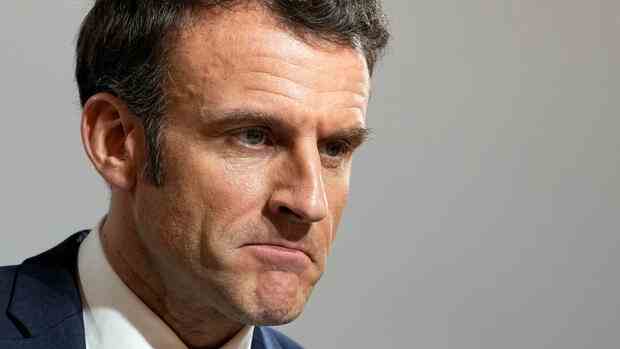Paris France’s Finance Minister Bruno Le Maire was confident: “There will be no majority to bring down the government,” he told the newspaper “Le Parisien”. But there is great uncertainty following President Emmanuel Macron’s decision to push through his controversial pension reform with special powers bypassing Parliament. His government faces a vote of no confidence in the National Assembly on Monday.
In polls, eight out of ten French people oppose the use of Article 49.3 of the Constitution, with which Macron wants to gradually raise the retirement age from 62 to 64 without the consent of Parliament.
Anger at the actions of the head of state erupted on the streets of Paris and other major cities over the weekend, and the unions announced that the strikes would continue. Macron’s government is facing a fateful week.
Two motions of no confidence were tabled in the National Assembly, one by the right-wing national Rassemblement National (National Union, RN), the other by the small center party Liot. The left-wing opposition alliance Nupes does not want to join forces with Marine Le Pen’s RN, but supports Liot’s initiative.
It would be conceivable that on Monday afternoon the right-wing national MPs would also vote in favor of the cross-party proposal from the small center party. Then it depends on the conservative-bourgeois Republicans. Macron’s center alliance has not had its own majority since last summer’s parliamentary elections.
>> Also read here: Macron pushes pension reform past Parliament – and risks political crisis
For the motion of no confidence to pass, 287 MPs must vote against the government, an absolute majority in the National Assembly. All opposition parties together have 298 MPs in the parliamentary chamber, a mathematical advantage of eleven votes. But Republican leader Éric Ciotti has said his 61-strong parliamentary group will not approve a no-confidence motion.
However, it is questionable whether all MPs will follow this line: contrary to the wishes of the party leadership, some Republicans have already refused to support the pension reform, which ultimately prompted Macron to use Article 49.3.
Finance Minister Le Maire said: “Let’s hope that the Republicans will find their bearings again.” If the vote of no confidence is successful, Macron will not be forced to dissolve parliament and call new elections. However, this step is then considered likely.
Are the protests increasing – and becoming more violent?
Macron’s Prime Minister Élisabeth Borne is aware that members of the government are currently not welcome guests: her office instructed ministers to suspend all planned travel in the country until further notice. Since the pension decision on Thursday, there have been spontaneous evening protests not only in Paris.
Macron’s government’s pension reform decision has sparked violent protests.
(Photo: dpa)
Demonstrators set fire to garbage cans and set up barricades. In Lyon, opponents of the pension reform violently entered a district town hall. The police used water cannon and tear gas in several cities, hundreds of people were arrested. Interior Minister Gérard Darmanin said there have also been attacks on prefectures of the state and constituency offices of MPs in various places in France.
The trade union alliance has announced another national protest day for Thursday. Since January, these rallies have often gathered more than a million people across the country.
“By and large it remains a peaceful social movement,” Laurent Frajerman, a sociologist who studies the radicalization of protest movements, told news channel BFMTV. However, the use of Article 49.3 of the Constitution “undoubtedly provoked a great deal of anger”.
Will France now be paralyzed by widespread strikes?
The protests against Macron’s pension reform have been affecting public life in France since January: long-distance trains were canceled, subways ran irregularly, schools and kindergartens were closed on a daily basis. Truck drivers blocked roads and garbage collectors didn’t show up for work.
The unions want to continue the strikes. Its influence is particularly strong in the state railway company SNCF, but other areas in the transport sector such as local transport and airports are also affected. The strike is also being followed closely by the energy companies Total Energies and EDF. The consequences could be paralyzed refineries and reduced electricity production in nuclear power plants.
>> Also read here: Garbage mountains, rats, stench – Paris is sinking in garbage
The hope of the unions is that Macron will give in under pressure from the street. As an example, they cite the planned flexibilization of the labor market under President Jacques Chirac in 2006: In the face of massive protests against relaxed protection against dismissal for first-time contracts for young workers, the government at the time withdrew the law.
What does the pension crisis mean for the rest of Macron’s term?
After his narrow re-election in spring 2022, Macron promised the French a new political style. “I know that many compatriots voted for me, not to support me, but to erect a bulwark against the extreme right,” he said in an election night speech in front of the Eiffel Tower. “I know your vote commits me for years to come.”
In the eyes of his critics, however, by going it alone with the pension, he has confirmed the image of the aloof head of state. Even if Macron’s government survives the vote of no confidence on Monday, the political crisis has not yet been defused. The President could respond with a government reshuffle and replace Prime Minister Borne.
But without a parliamentary majority and after the controversial approach to pensions, it will be difficult for Macron to get further major reform projects off the ground. Marine Le Pen in particular could benefit from the political mood, which has recently increased in surveys.
Political scientists Bruno Palier and Paulus Wagner from the think tank Terra Nova wrote in an analysis published last week that the pension dispute “is only likely to increase the dynamics of the RN”.
More: Marine Le Pen benefits from dispute over pension reform
